Over the years, Garmin has managed to maintain a significant presence in the outdoor smartwatch market, and one of their favourite series is the mid-range Forerunner 2 Series of which the Forerunner 265 is the latest in the lineup, succeeding the Forerunner 255. Like its predecessor, the Forerunner 265 comes in two sizes; 42 and 46mm. Though, unlike its predecessor, there’s no more non-music version. There are only two models and these two support onboard music storage.
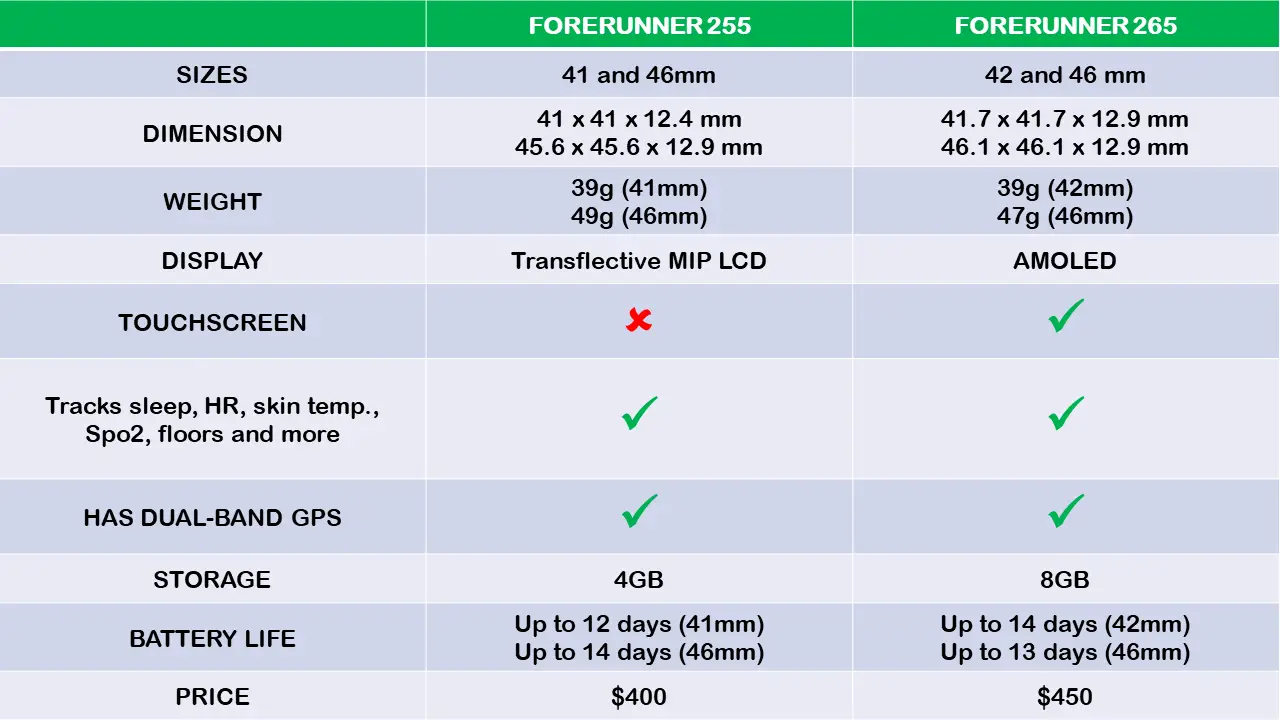
In a few words, the Forerunner 265, unlike its predecessor, has a more colorful AMOLED display, a higher storage capacity, features a touch-sensitive screen and has more activity-tracking features including the newly added Training Readiness. Meanwhile, there is not much difference in battery life.
So, is the Forerunner 265 actually better than the Forerunner 255? What’s the difference? Should you upgrade if you already own the 255? I’ll be discussing the differences between these two AWESOME watches to help you decide which is a better companion for your outdoor explorations.
We’ll also look at the difference between the Forerunner 265s and 265 to help choose the right size for you.
Garmin Forerunner 255 vs 265s vs 265 Full Specifications Comparison
Forerunner 255 vs 265: What’s New?
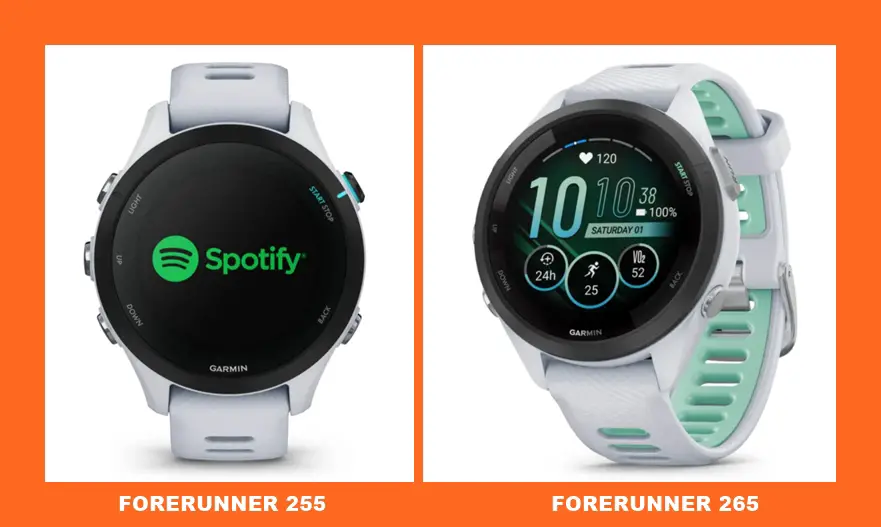
The Forerunner 255 looks very much like the Forerunner 265, and both have very similar features. The difference here is the display, music storage capacity, activity tracking features and of course battery life. If you want an easy-to-read display under direct sunlight with a low impact on battery life, then the Forerunner 255 is a nice pick. On the other hand, if you want a more colorful display which isn’t so easy to read outdoors but awesome indoors, the 265 is a nice choice. Though, with a higher storage capacity for music lovers and a few additional activity-tracking features, the Forerunner 265 is no doubt a better watch than the 255.
Forerunner 255 vs 265: Display (Forerunner 265 has a more colorful display)
The main difference between the Forerunner 255 and 265 is the display type. Garmin last year decided it was time to move to a more colorful display for their outdoor watches. While the Forerunner 255 is equipped with a transflective MIP display that’s very easy to read outdoors, the 265 has an AMOLED display.
Because the MIP display has a low impact on the battery, it supports always-on at full brightness. With the 265, always-on is present but that only dims the screen and you will have to get used to flicking your hand to wake the screen. Nonetheless, a user who owns the 265 said initially he wasn’t so comfortable having to gesture to wake the screen but he soon became comfortable with it.
Personally, I love AMOLED displays even though it’s not so easy to read outdoors but indoors it’s more satisfying to watch. Moreover, Garmin has introduced a Red Shift mode feature that will allow you to swap display colors, this gives you the option to choose a color that’s more suiting to your eyes. The bottom line, it all depends on which display type you prefer.
Forerunner 255 vs 265: Design
In terms of design, there’s no difference between the two. The Forerunner 265 like its predecessor, has a fiber-polymer case with Corning Gorilla Glass 3 gracing the screen. The band still comes in a silicone material and it can be changed just in case you don’t like it. Both watches have 5 physical buttons, though the Forerunner 265 like the Forerunner 965 has a touch-sensitive screen.
So in terms of build quality, nothing much has changed except for the touch-sensitive screen.
Forerunner 255 vs 265: Activity Tracking (Forerunner 265 has more features)
As usual, Activity tracking is at the core of every Garmin watch, so you can expect comprehensive activity tracking with both watches. Each of these two is equipped with multi-band GPS for greater accuracy in route tracking. Each of these two will also track your sleep, calories, heart rate, stress and blood oxygen. Moreover, features like Health snapshot, incidental fall detection, respiratory rate and nap detection are available on both watches.
Though, the Forerunner 265 being a newer watch features a little more activity tracking features. It features the newly introduced Training Readiness that gives you a score based on your sleep quality, HRV, stress and recovery time to help you maximize your training efficiency. It also features more outdoor recreational features like area calculation and fishing forecast which are not present in Forerunner 255.
Forerunner 255 vs 265: Music Storage (Forerunner 265 has a higher storage)
Like I mentioned earlier, unlike the 255 there is no non-music version in Forerunner 265. There is only one model for the 42 and 46mm sizes and each of these supports onboard music storage. Moreover, while the Forerunner 255 is equipped with 4GB storage, it’s 8GB for the 265. That’s more space for more of your favorite tracks. You can add your personal tracks to the watch or download music with supported services like Spotify, Deezer and Amazon Music.
Forerunner 255 vs 265: Battery Life (Forerunner 255 has a slightly longer battery life)
In terms of battery life, there is not much difference between the Forerunner 255 and 265. Each of these two will keep you going for days. However, thanks to its MIP display which has a lower impact on battery life, the 255 has a little longer battery life than the 265.
According to Garmin, you can get up to 14 days with the 255, and with the 265 it’s up to 13 days. That’s a day of longer battery life which can make all the difference, especially for hikers. Though, surprisingly, the 265s has up to 15 days of battery life.
Forerunner 255 vs 265: Price (Forerunner 255 is cheaper)
As a result of the more colorful AMOLED display, higher storage and more activity tracking features, the Forerunner 265 has a slightly higher price tag. While the 255 retails for $399, it’s $449 for the 265. That’s $50 more.
So, is an AMOLED display, higher storage and more activity-tracking features worth the extra $50? For me, it’s not just about the higher price, I will go for the Forerunner 265 because it’s a newer watch with more features and will get newer features in the future. While Garmin does so well in updating their older watches they have a tradition of limiting newer features to newer models.
On the other hand, if you choose the Forerunner 255, you still have a fantastic watch with a long battery life and an easier-to-read display outdoors.
Forerunner 265s vs 265- What’s the Difference?
So now that you know the difference between the Forerunner 255 and 265, let’s take a look at the differences between the Forerunner 265s and 265. Basically, the Forerunner 265s and 265 are the same, these are two identical watches with the same features, design, storage capacity and price.
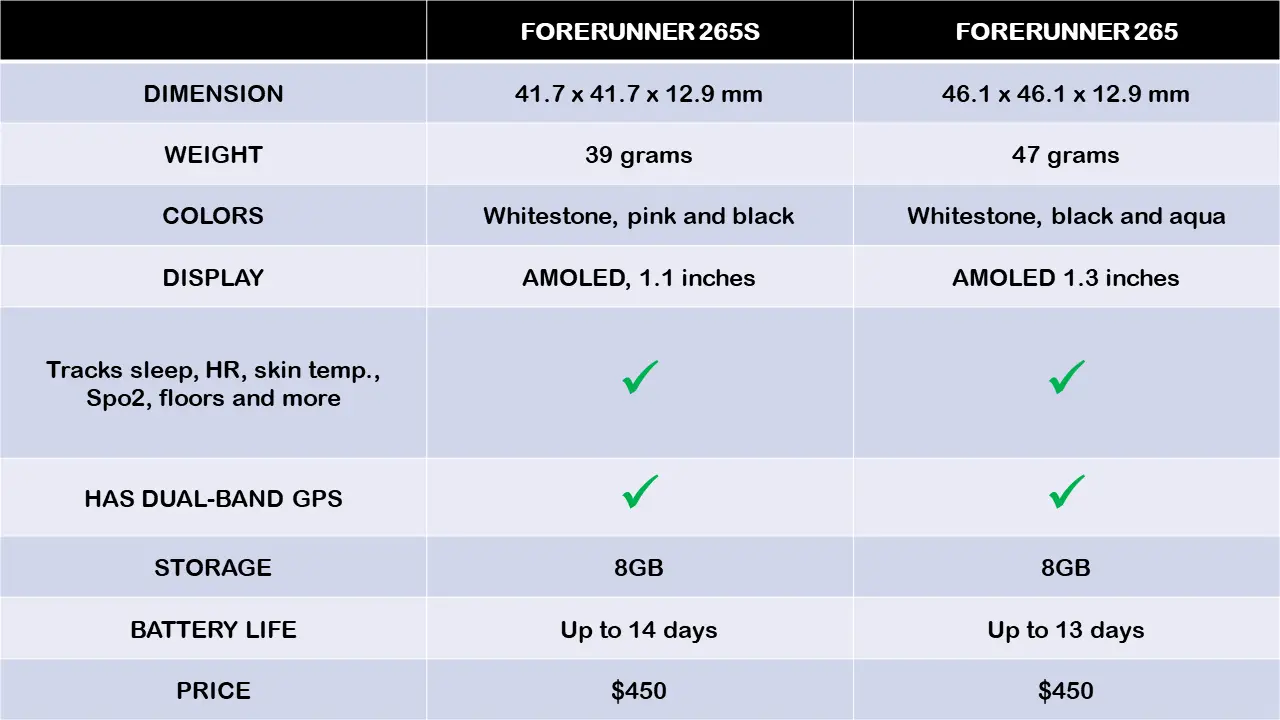
The only difference between these two is the size and battery life. The Forerunner 265 which is bigger has a bigger display, however, the 265s with its smaller display has a slightly longer battery life.
Forerunner 265s vs 265: Design and Display
Manufacturers acknowledging that we all have different wrist sizes make different sizes of the same watch to give you the end user the option of choosing your preferred size. This is the case with the Forerunner 265 just like it is with the Galaxy Watch 6 and Apple Watch Series 9. The Forerunner 265s and 265 have the same fiber-polymer frame with Corning Gorilla Glass 3 protecting the display on both watches.
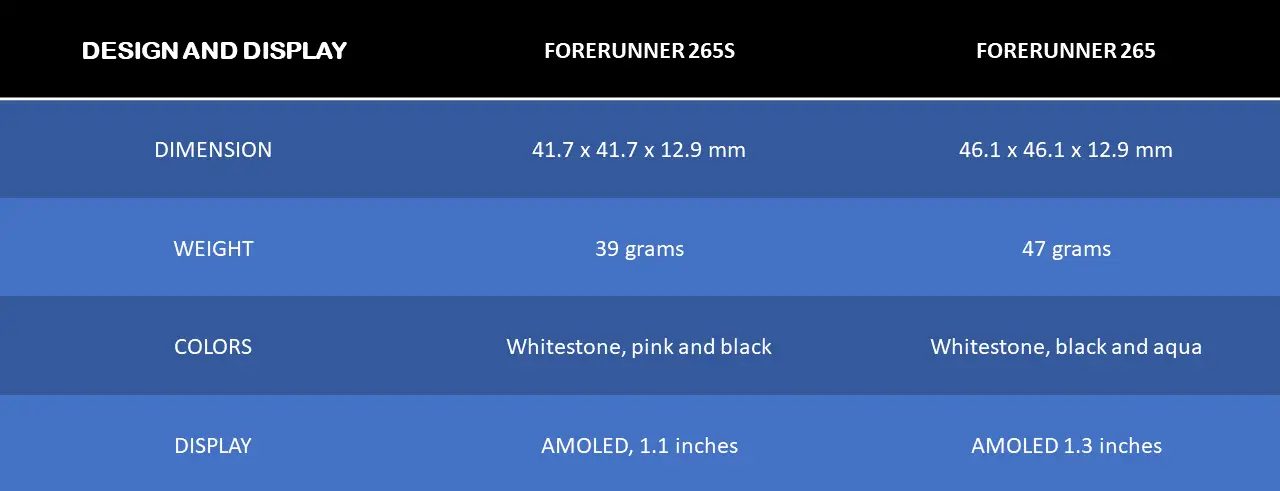
However, while the 265s comes in a 41.7mm case, the Forerunner 265 comes in a 46.1 mm case size. As a result, the Forerunner 265s weighs 8 grams less than the 265. Nonetheless, the 265 at 47 grams is still a very lightweight watch. Moreover, the strap sizes also differ. While the Forerunner 265s is compatible with 18mm wide straps, it is 22mm for the Forerunner 265.
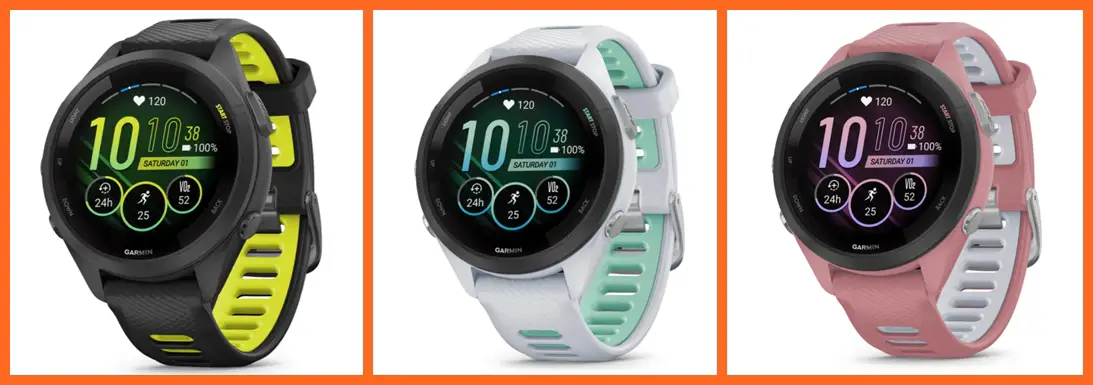
In terms of available colors, while the Forerunner 265s is available in pink, whitestone and black, the Forerunner 265 is available in whitestone, black and aqua colors.
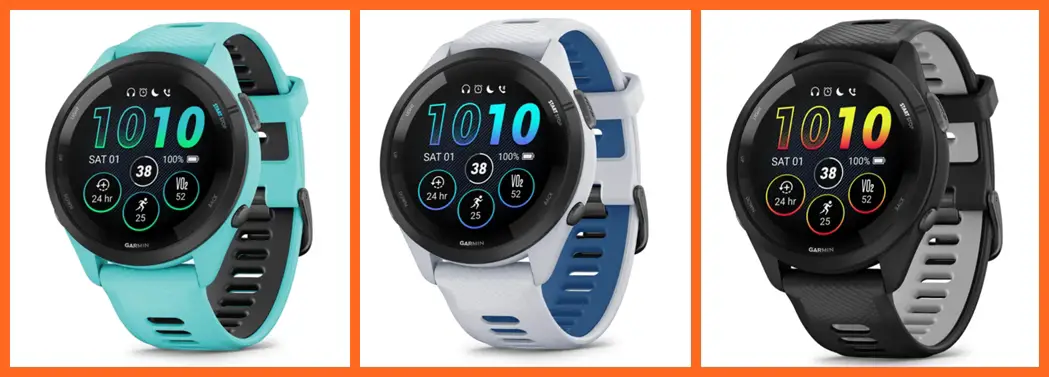
In the display department, both watches have the same AMOLED display which is more colorful than the MIP display of Forerunner 255, though the display sizes differ. While the Forerunner 265s has a 1.1 inches display, the Forerunner 265 has a 1.3 inches display that lets you see a little more at a glance.
So as I mentioned above, it’s the same design and display for the Forerunner 265s and 265 but the sizes differ.
Forerunner 265s vs 265: Activity tracking features
Tracking your daily activities and helping you reach your fitness goals is the primary function of the Forerunner 265s and 265. Both watches have similar activity tracking features, and as you would expect from a Garmin watch, the Forerunner 265 and 265s have loads of activity tracking features. Each of these two comes equipped with sensors that enable the watch to monitor your heart rate, sleep, stress, blood oxygen and skin temperature. Each of these two also has an inbuilt GPS with support for multi-band GPS that maintains mapping accuracy even in difficult terrains with very tall buildings or trees. Both watches also feature training readiness, training status, health snapshot, incidental fall detection and many sports profiles.
So as far as tracking your daily activities is concerned, both the Forerunner 265s and 265 are comprehensive activity trackers.
Forerunner 265s vs 265: Media
Regarding media storage, you get the same 8GB storage capacity for both the Forerunner 265s and 265. You have the option to add your personal music and you can also download music from supported music streaming services like Amazon Music, Spotify or Deezer. Once music is added to the watch you can connect a Bluetooth headphone to enjoy music offline.
Forerunner 265s vs 265: Battery
Just like its predecessor, the Forerunner 265 also has a long battery life that lets you go multiple days from a single charge. Though, and surprising too, the Forerunner 265s has a longer battery life.

On mixed usage, Garmin claims you get up to 13 days with the Forerunner 265 and up to 15 days with the 265s. With all GNSS enabled, including multi-band GPS, it’s up to 14hrs with the Forerunner 265 and up to 15hrs with the 265s. Furthermore, by playing music with GPS tracking enabled, you can get up to 6 hours with both the Forerunner 265 and 265s.
So basically, with minimal usage, you can get up to two weeks with the Forerunner 265 and a little over that with the 265s. To get even longer battery life, I’ll recommend reducing display brightness.
Forerunner 265s vs 265: Price
Despite the differences in size, the Forerunner 265s and 265 have the same price tag. Both retail for $449. That’s perhaps a moderate price for one of Garmin’s most popular series.
Forerunner 265s vs 265: Which Is Right For You?
From the design and features, the Forerunner 265s and 265 are the same but differ in size. The option of size acknowledges that we all have different wrist sizes and of course, gives you the end user the option to choose your preferred size.
In other words, the Forerunner 265s is best for individuals with small to medium-sized wrist while the Forerunner 265 is best suitable for individuals with medium to big wrist sizes. The absolute best way to determine which size is best for you is to take the measurement of your wrist and then compare it with the two sizes.
For instance, the width of my wrist measures 47mm so I will go with the Forerunner 265.

